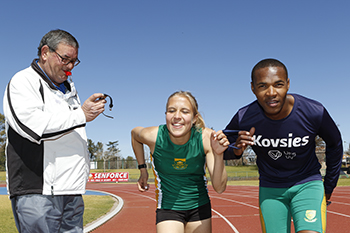Latest News Archive
Please select Category, Year, and then Month to display items
12 January 2024
|
Story Nonsindiswe Qwabe
|
Photo Sonia Small
 Since joining the UFS in 2008, Dr Grey Magaiza has worked extensively on approaches that can foster the socio-economic transformation of societies.
Since joining the UFS in 2008, Dr Grey Magaiza has worked extensively on approaches that can foster the socio-economic transformation of societies.
“The future should be one where communities can decide on their development agenda and futures. That’s the most important for me.” Dr Grey Magaiza, Deputy Director of the Centre for Gender and Africa Studies (CGAS) and Head of the Community Development programme on the Qwaqwa Campus, is passionate about capacitating communities to be agents of change and advancement. His vision for the future emphasises the empowerment of communities to take charge of their development by actively participating in decision making and the implementation of development projects that can improve their lives.
Since joining the UFS in 2008, Dr Magaiza has worked extensively on approaches that can foster the socio-economic transformation of societies. Over the years, he has crafted his research speciality into one that he is most proud of – being an interdisciplinary scientist immersed in the development of communities.
“I’m in a fortunate position of researching what I like. I say ‘fortunate’, because I’ve taken the time to understand what I’m passionate about, which is the overall field of rural livelihoods and livelihood futures – in short, community development. My research starts from an engaged university, understanding the elements that a university must use to enhance transformation and relevance to its immediate community in terms of development.”
One of the ways he has done this is by looking at social entrepreneurship as a development approach for young people in a rural setting. Through workshops with non-profit and civic organisations in Qwaqwa, Dr Magaiza has been helping these organisations to map out their needs and actively meet them through the involvement and support of external role players.
“We understand that communities are part of the national development agenda, but even that national agenda respects community knowledge and intentions and allows communities to shape their identity. A critical enabler of this is community organising. You bring back the capacity in communities to have dialogues on issues affecting them as spaces for engagement, knowledge exchange, and for people to just talk about their way forward.”
By enabling communities to define their development agenda, they can address their specific needs, challenges, and aspirations, he said. “When I look at livelihood futures, it’s quite an exciting aspect of my work – it’s like looking into a fortune tellers’ globe, because you’re not deciding for communities what they should do, but the communities themselves take those decisions.”
UFS Paralympic athlete Louzanne ready for Rio
2016-09-12

Rufus Botha (coach, left), Louzanne Coetzee,
and her guide Khothatso Mokone during a training
session for the Rio 2016 Paralympic Games.
Photo: Johan Roux
“Coetzee is someone with a lot of perseverance. She is becoming a world-class athlete with the help of her guide, Khothatso Mokone.” These were the words from Rufus Botha, the coach of 23-year-old Louzanne Coetzee.
Coetzee, who works at the Institute for Reconciliation and Social Justice at the University of the Free State (UFS), said that the 2016 Paralympics in Rio de Janeiro was never a big dream for her, because she never thought she was good enough to make it, but God had a different plan for her life.
Louzanne and her formidable team
Coetzee said that she still struggles to come to terms with the fact that she is competing at the Paralympics and experiences a rollercoaster of emotions. “I am excited, nervous, and confused all at the same time.”
According to Botha, who has been her coach for the past four years, Coetzee and her guide have such a unique rhythm and work together well. “After Mokone, also a former Kovsie, stepped into the picture, everything just escalated.”
The 2016 Paralympics and beyond
“Coetzee is someone with a lot of
perseverance and is becoming a
world-class athlete.”
“Making the Paralympic team is already a bonus. The next target we are aiming for, is for her to reach the finals in the 1500 m,” Botha said.
Coetzee and Mokone were included in the South African team to participate in Rio from 7 to 18 September 2016. Her heat takes place on 15 September 2016 and the finals of the 1500 m on 17 September 2016.
Coetzee’s main goal after the Paralympics is the World ParaAthletics Championships in London 2017.